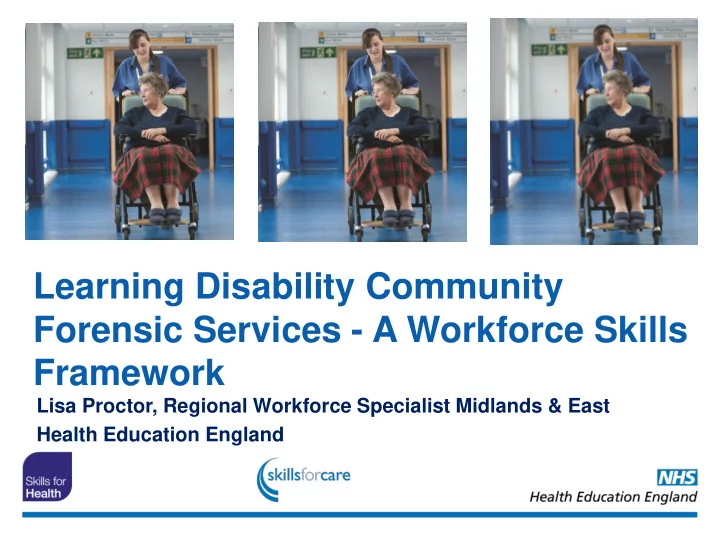

Learning Disability Community Forensic Services - A Workforce Skills Framework Lisa Proctor, Regional Workforce Specialist Midlands & East Health Education England
Background • NHSE - Building the Right Support 2015 – A National Plan for the delivery of services for people with learning disabilities requires local areas to:- • Reduce reliance on inpatient beds • Reduce CCG commissioned and specialist commissioned beds to 10-15 and 20-25 per million population respectively • Requirement to develop new community models of service to enable people to live in community – including community forensic support
Community Forensic Function NHSE SERVICE SPECIFICATION • Forensic risk assessment and management of risk in the community to ensure public Managing Forensic Risk safety and safety of the individual • Delivery of offence specific therapeutic interventions (e.g. to prevent sexual/violent STAFF SELF PUBLIC offences). • Case management of the most complex cases • Support and training to other agencies providing day to day support to this group • Consultancy and advice to system partners • In reach support to ensure safe and timely discharge
What is now ? Short survey of pathways to care for a number of vignettes confirmed:- • Pathways to care very different across the country • Pathways dependant on and influenced by the availability of local services • Accessibility criteria varies considerably according to commissioning • Accessibility criteria for complementary services not always aligned • Perceived skills shortages – social workers in teams or working with teams as critical in discharge and support of people with forensic needs in community
Specialist Health & Statutory Care Workforce Skills Some challenges … Statutory Community Health & Care Teams Social Care Support for Day to Day Living Needs Ways of Working Statutory health & care CJS providers Independent sector
The breadth of the workforce that supports people with learning disabilities and forensic needs in the community HEALTH WORKFORCE SOCIAL CARE WORKFORCE CRIMINAL JUSTICE COMMUNITY/HOME EDUCATION/ WORKFORCE SUPPORT WORKFORCE EMPLOYMENT WORKFORCE Children’s Health Teams Children’s Social Worker Police Families and unpaid Teaching Staff CAMHS Teams Teams PCSO carers Teaching Assistants Transition Nursing Teams Adults Social Worker Teams Prison staff Charities Careers staff School Health Specialist Forensic Social Probation and other Voluntary Agencies Pastoral workers Teams/Adviser Workers NOMS workers Housing Association Behaviour support Health Early intervention Registered Managers Court staff including workers Job centre staff teams Residential Care Teams magistrates, judge’s Supported Living Benefits workers General Practioners Short break services clerks and officials workers Further Education Adult Community Learning Community support teams CPS staff Shared lives scheme College staff Disability Teams Re-ablement Teams workers EHCP Assessors Adult community mental Children’s Early intervention Youth workers Special Educational health teams teams Youth offending teams Needs Co-ordinator Adults Community Forensic Substance abuse teams Directly employed Education tutors MH Teams Advocates workers – e.g. personal Adult Learning Disability Adult social care assistants Intensive Support Teams commissioners Independent advocates Adult liaison and diversion Children’s social care Security personnel teams commissioners Housing/homeless/acco CAMHS Health mmodation workers Commissioners Adult MH Health Commissioners Adult Learning Disability Commissioners
Key workforce challenges • Commissioning uncertainty – ensuring quality of new and different models of service with risk held locally • Availability of resources limited • Uncertainty in some areas about delivering specialist community forensic health and statutory care services – new service model • Uncertainty about delivering care and support in the community – and new opportunities
A Workforce Skills Framework • HEE has developed a workforce competency framework for the delivery of learning disability community forensic services • Identifies key pathway points • Details skills and competences to deliver at each point & those competencies required by the team • Does not detail which workforce groups should have what skills – driven by delivery model • Distinguishes separate section for support workers • Is mapped to other key standards – forensic standards, social work forensic capabilities • Has been produced in consultation with people with learning disabilities with lived experience of forensic support.
The pathway points Access to Services, Assessment, Care Coordination and Formulation and Enabling Health Risk Management Intervention/treatment Interventions planning Therapeutic Role Support Family/Carer Interventions Interventions Interventions Monitoring and Accommodation and Support Worker Measurement , Research welfare interventions and Evaluation Specific
A tool - how can it be used ? • TCP’s can map forensic function to check whether competencies are available across the wider team • Providers can use the framework to develop training plans and assess competence. • Education providers can use the framework to develop education programmes. • Commissioners can use the framework to develop standards for support workers competence when commissioning packages of care
Next Steps • Publish framework • Formal launch • Work to consider the "how" of ensuring that skills are embedded within the workforce
For further information Lisa Proctor Health Education England Lisa.Proctor@hee.nhs.uk Health Education England – Community Forensic framework Access this framework.
Recommend
More recommend